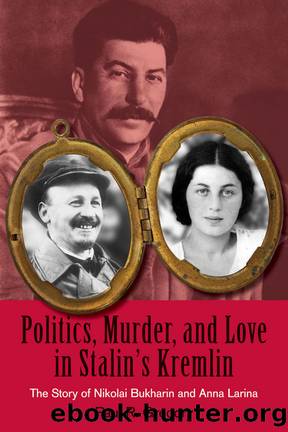Politics, Murder, and Love in Stalin's Kremlin: The Story of Nikolai Bukharin and Anna Larina by Paul R. Gregory

Author:Paul R. Gregory [Gregory, Paul R.]
Language: eng
Format: epub
Tags: Political Science, World, Russian & Former Soviet Union
ISBN: 9780817910365
Google: -P3eP92Ll5MC
Publisher: Hoover Press
Published: 2013-09-01T12:39:40+00:00
CHAPTER 30
December 1936âJanuary 1937: Confrontations
AFTER THE DECEMBER 4 PLENUM, Bukharin spent the next three months shuttered in a small room in his Kremlin apartment. Ironically, it was Stalin's former bedroom, the very place in which Stalin's wife, Nadezhda, committed suicide. Bukharin lamented: âNadia died here. So will I.â213
The room had a small sink and toilet, and Nikolai scarcely left it.
NKVD couriers brought the incriminating testimonies of associates and friends to his door. As he read them, he remarked: âIf I were someone unknown to myself, I would believe it all.â He left the apartment only to attend confrontations with his accusers.
Bukharin, despite all, continued to cling to a thread of hope, even while whispering to Anna, âCould it be that Koba has lost his mind?â214 Frantically dispatched long letters to the Master to rebut the slanders produced no replies. Anna noticed that Bukharin was growing thin and old, his red hair turning gray.
Save when tending to their child, she was constantly at her husband's side. On one occasion, she returned to see him with a revolver in his right hand and his left supporting his head. In response to her frightened scream, he said that he was not able to do it yet, and that in any case it should not happen in her presence.215
At the end of December, a courier delivered a package with five seals containing the testimony of Karl Radek, his close friend of twenty years, who testified that Bukharin was involved in various terrorist activities. Bukharin and Radek had been youthful allies in exile before the revolution. They worked together closely in the Comintern, and Radek was a chief correspondent under Bukharin for Izvestiia.
Bukharin's one-word reaction to Radek's testimony: âawful!â He was especially bitter because he had intervened twice on Radek's behalf when the latter was arrested and imprisoned. He would later tell the Central Committee that he had âspent sleepless nights thinking whether I should have done thisâ¦. But should I turn into such a coward that I am not ready to take such a risk?â216
Summoned to a confrontation with Radek on January 13, 1937, Bukharin hoped he could persuade Radek to retract his testimony.217 One can imagine the mood as the old friends confronted each other under the watchful eyes of virtually the entire Politburo. Bukharin came to the meeting from his Kremlin apartment; Radek was brought in from his prison cell.
Ezhov, who was presiding, began by asking Radek to summarize his charges. Radek testified that he was instructed to be Bukharin's contact person with the Trotskyites after Bukharin assumed the Izvestiia editorship in the spring of 1934. It was not until summer that they had a direct discussion about their âinsane situationsâ as leaders in the leftist and rightist blocs.
Bukharin told him, Radek testified, that âour attitude is the same as yours, an attitude in favor of terrorâ and that he, Rykov, and Tomskii were the leaders of the rightists. Radek added that he did not need to tell Bukharin who led the Left because Bukharin âhad already been in contact with Piatakovâ on that subject.
Download
This site does not store any files on its server. We only index and link to content provided by other sites. Please contact the content providers to delete copyright contents if any and email us, we'll remove relevant links or contents immediately.
| Arms Control | Diplomacy |
| Security | Trades & Tariffs |
| Treaties | African |
| Asian | Australian & Oceanian |
| Canadian | Caribbean & Latin American |
| European | Middle Eastern |
| Russian & Former Soviet Union |
The Secret History by Donna Tartt(19092)
The Social Justice Warrior Handbook by Lisa De Pasquale(12190)
Thirteen Reasons Why by Jay Asher(8912)
This Is How You Lose Her by Junot Diaz(6888)
Weapons of Math Destruction by Cathy O'Neil(6281)
Zero to One by Peter Thiel(5802)
Beartown by Fredrik Backman(5756)
The Myth of the Strong Leader by Archie Brown(5509)
The Fire Next Time by James Baldwin(5447)
How Democracies Die by Steven Levitsky & Daniel Ziblatt(5219)
Promise Me, Dad by Joe Biden(5154)
Stone's Rules by Roger Stone(5088)
A Higher Loyalty: Truth, Lies, and Leadership by James Comey(4964)
100 Deadly Skills by Clint Emerson(4926)
Rise and Kill First by Ronen Bergman(4790)
Secrecy World by Jake Bernstein(4753)
The David Icke Guide to the Global Conspiracy (and how to end it) by David Icke(4720)
The Farm by Tom Rob Smith(4514)
The Doomsday Machine by Daniel Ellsberg(4490)
